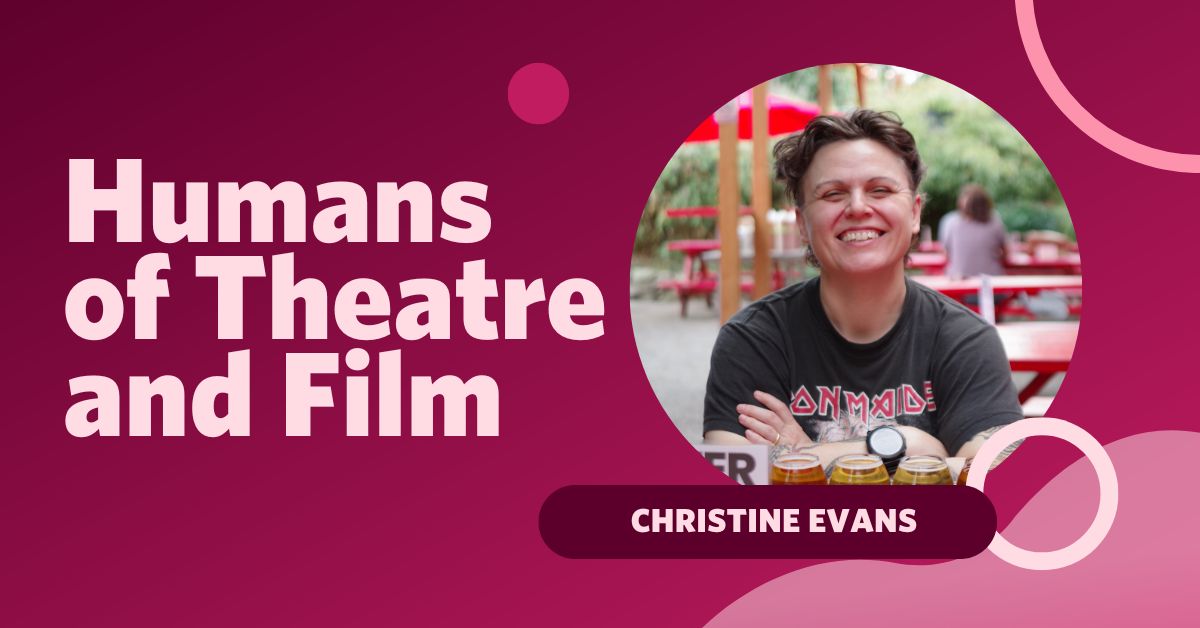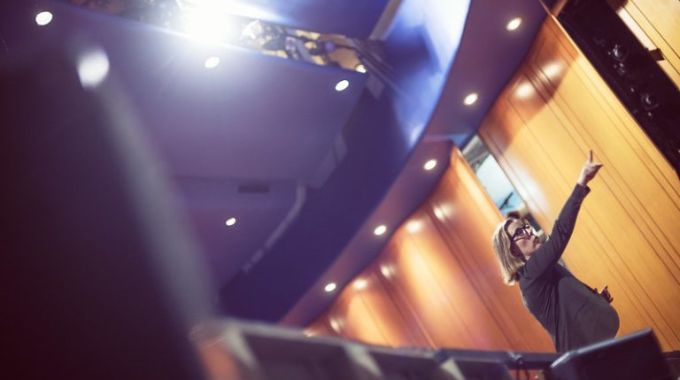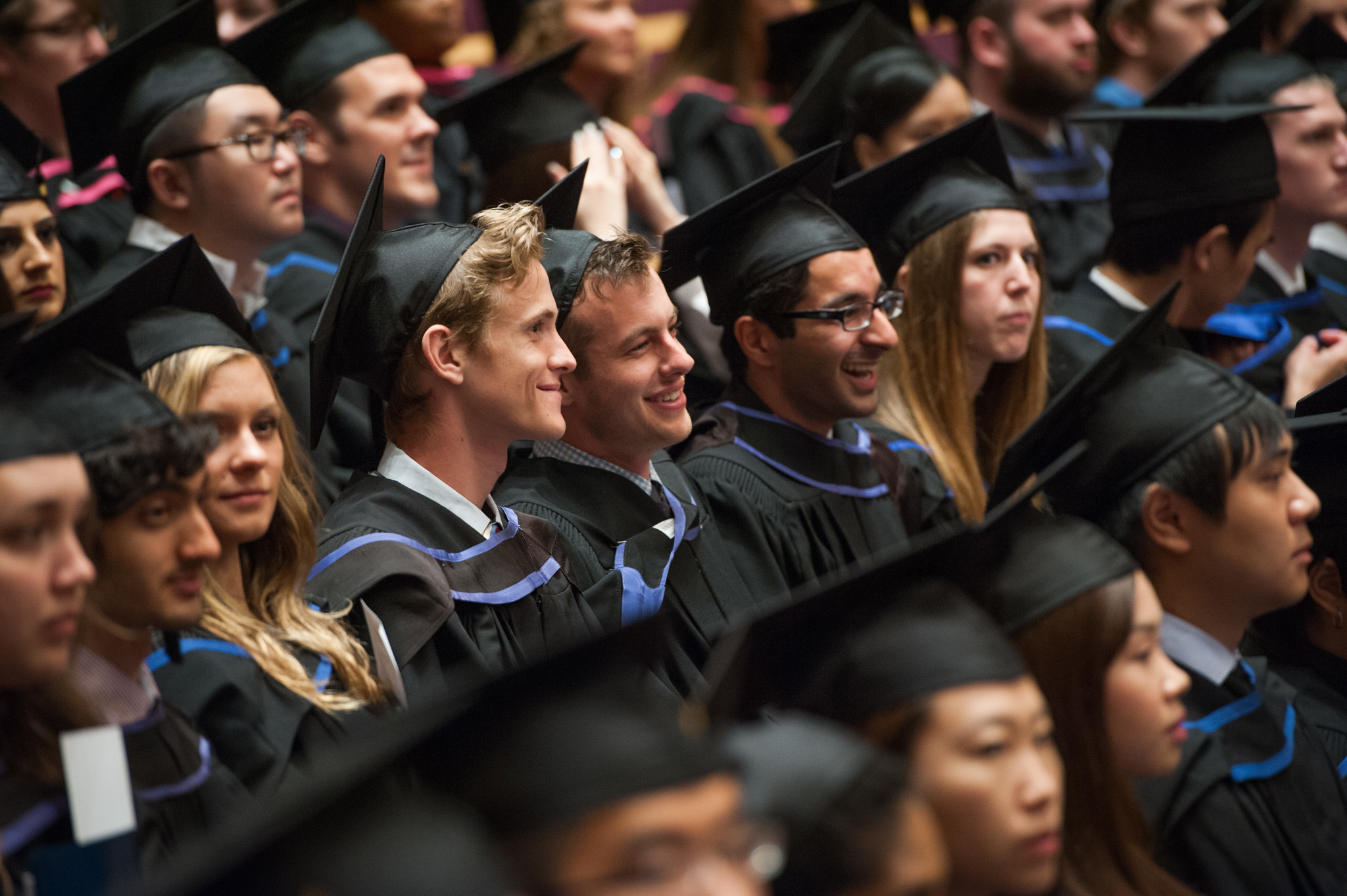

When many of us think of theatre and film, we picture the thrill of showtime, the call of action, and the timeless question: ‘to be or not to be?’
While these fields are undeniably action-packed and creative, they encompass so much more. They’re about crafting and studying whole worlds. Theorizing and analyzing all those intricate moving parts that build experiences. Delighting audiences and inspiring them to reflect upon their own assumptions of what it means to be human.
The Department of Theatre and Film at UBC is home to a diverse group of passionate and talented professors, staff, and students, who specialize in a wide range of theories, practices, genres, and methods. Next up in this series is Christine Evans, Assistant Professor, Cinema Studies. Christine discusses the hidden work behind good education, why cinema deserves serious study, and how she found her perfect place in academia.
Congrats on receiving this year’s Dean of Arts Educational Leadership & Innovation Award! Can you tell us about the project you are working on?
Thanks! “Educational Leadership” has a lot to do with how students go through the learning process. My students know that I am always banging on about ‘form over content’ or how an artwork’s form allows us to understand and respond to its content in particular ways. Educational Leadership is very much about the form of learning, the way that students learn, and the structures that are put into place under the hood to facilitate that experience.
For this project, I’m investigating the way that our department as a whole—and not just each individual program—communicates its interdisciplinary aims to students. How can the Department of Theatre and Film harness our identity as an interconnected, interdisciplinary department? How can we communicate that identity more transparently to students and the UBC community? How can we include current and prospective students in that process so that they’ll have a solid sense of the kinds of scholars, academics, artists, or practitioners they’ll be once they graduate? These are some of the questions I’m asking in this project.
What does it mean to you to receive the award?
This is a very meaningful award to receive and a great time to receive it. Our department has grown very rapidly over the last few years and it has been itching to take advantage of that growth. Awards and grants are often focused on specific research topics, but it’s harder to find awards that allow scholars to do work on their department. Awards usually benefit departments in less direct ways, and many universities expect departments to function like naturally evolved social groups, happy relationships, or passion projects: if you want to make them run smoothly, you do it on your own time, out of the goodness of your heart. But academics are busy people, goodness isn’t absolute, and change within an institutional framework involves more than just sheer will or good vibes: it requires infrastructure. It’s great that UBC recognizes that this kind of work takes time and funding as much as ‘standard’ research projects do.
What advice do you have for students considering a degree in Cinema Studies?
Film draws on a whole variety of earlier arts and is itself the precursor of many newer art forms such as television and video games. Media literacy and the ability to engage rigorously and confidently with screen-based media is a prized skill in our contemporary cultural landscape. In many ways, we need to understand cinema now more than ever before. It has changed the way that we think of time and space; of what it means to look at people, places, and things; of surveillance, observation, and empathy; and of the power of form and style to manipulate emotion. Cinema is amazing. It’s not just that individual films or directors or genres are amazing—although that’s also true—but cinema itself is amazing, and it will always warrant academic study.
Here’s some more specific advice. Feel free to contact me with any questions you have about the degree. I am the Director of Undergraduate Studies for Cinema Studies, after all—answering your questions while rhapsodizing about the awesomeness of Cinema Studies is part of my job. And secondly, check out the UBC Calendar entry for Cinema Studies for information on how to apply for the program and what degree progression looks like. It’s true that the UBC Calendar, like Film Art by Bordwell, Thompson, and Smith, is not a thrill-a-minute page turner. But, also like Film Art, it is incredibly informative.
What do you enjoy most about teaching?
If you think about any art form long enough, you realize how inherently strange it is. Art is one of the ways that we make sense of ourselves, and we are a messed up, conflicted, naïve, beautiful, and eternally hopeful species. It makes sense that we’ve invented all of these different but connected and codified ways to represent our thoughts, feelings, fantasies, and world to ourselves. This is one major thing I enjoy about teaching: asking students to consider the weirdness of things we just accept as a part of our cultural landscape, behaviours we are convinced are natural, just, and right. To make these things slightly strange allows us to see them as the crucial fantasies that structure and inform our reality: not as good or bad, right or wrong, but as telling.
You know that painting by Holbein, The Ambassadors? Two dudes with their astronomy gear and some weird smear on the floor. Okay, cool. But if you look at the painting from a slightly different angle—an angle that you’re not actually meant to assume when looking at paintings—then that elongated smear turns out to be a skull, invisible when the painting is perceived ‘correctly’ and visible only when viewed askance. Is that skull the ‘truth’ of the painting? Is the painting nothing without the skull? No, it’s just another dimension of the painting. But if we didn’t know that we could look at The Ambassadors from a strange perspective, we’d never see that dimension. The skull isn’t what interests me in The Ambassadors—it’s the gaze itself, the little turn the spectator makes to bring the skull into focus. To me, that’s what teaching is about.


Jean de Dinteville and Georges de Selve (‘The Ambassadors’) Artist: Hans Holbein the Younger
How did you know academia was for you?
When I first started my undergraduate career, I wanted to be a filmmaker. I think this is how a lot of young people get into Cinema Studies, because they know they love cinema but they aren’t sure if there’s anything they can do with that love other than making actual films. I thought the same thing, and I’d kind of accepted that the only way I could appropriately express my cinephilia was through filmmaking. I had a problem, though. I hated making films. I made a few of them and, it’s not just that they were awful (they were), but I found the whole process boring, annoying, and super embarrassing.
Everything changed in my second year when I took a film theory course. I took a course with our own Lisa Coulthard, who was a Ph.D. candidate at the time, and she assigned us an essay by Slavoj Zizek called “From the Sublime to the Ridiculous: the Sexual Act in Cinema.” That one-two punch of film theory + Zizek’s unique brand of Lacanian-Hegelian-Marxist philosophy made me feel like my entire view on existence went from squinting through a keyhole to an immersive panorama. In the same way that you just ‘know’ when you fall in love, the way that my love of cinema aligned with film theory and psychoanalytic theory felt as if it had been handcrafted specifically for me. And I was happy that I could leave filmmaking practice to those talented people who express their cinephilia creatively and artistically so that I could explore my own cinephilia in different ways: academically, theoretically, and philosophically.
You will be teaching in the Arts One program in the fall. What are you most looking forward to with that?
I just finished my first year teaching with Arts One so this fall will be my second go-around, and I’m looking forward to everything. Arts One is known for nurturing students who are intellectual, essay-writing juggernauts. It demands a special kind of student but cultivates an even richer one: intellectually curious, flexible, professional, with a talent for giving and receiving constructive criticism.
After having taught Arts One for a year, I got to see every single one of my students evolve into an improved academic version of whoever they were when they arrived, and it was incredibly rewarding as an instructor to see that kind of enhancement and change over so many essays. I became very attached to my particular group of students, which was a new experience for me with first years. Usually I only get to know a few of my first year CINE 100 students because the class is so large. That’s important too, but it was nice to find myself cheering so hard for first year students who I really got to know. That’s inevitable when you see one another four days a week and are receiving constant feedback on your progress.
How do you like to have fun?
I have the most fun talking about film theory. However, I also enjoy other things. I love boxing and I very sincerely enjoy going to my boxing club for classes and training sessions. When I started boxing, I thought it would be fun to do an activity where I could switch my brain off and just be aggressive. It turns out that boxing is like chess, except your opponent is trying to smash your face in the whole time. It involves a lot of quick thinking, strategy, memorization, and precise footwork. You can’t turn your brain off, and, while you have to be aggressive, you have to be smart about it. It’s fun to be challenged in this way. I also enjoy making and drinking cocktails (here’s one for your summer parties: Martinez recipe: 2 oz gin, 1 oz red vermouth, 1 bar spoon maraschino liqueur, 3 dashes Boker’s Bitters; stir with ice for 75 seconds, strain into chilled coupe, garnish with lemon twist or orange twist or maraschino cherry), collecting dumbphones, looking at my cat, and complaining about how everyone needs to get off social media.
What is your favourite way to relax?
I love playing video games (anyone who has ever visited my office knows about my Red Dead Redemption 2 problem, but I also love Souls games, the BioShock trilogy, and am really looking forward to Death Stranding 2 and the new Doom this summer). I also unironically enjoy utter trash reality TV, which is my wife’s doing and I thank her for it. She got me started on Vanderpump Rules, which was the gateway drug to The Real Housewives of Beverly Hills, every imaginable iteration of Below Deck, and The Valley. I’m also fastidiously, disturbingly clean so I find it relaxing to (constantly) clean my house.
Is there a favourite movie/tv show/book you’ve enjoyed lately?
I recommend that everyone reads Roland Barthes’ Camera Lucida: Reflections on Photography over the summer. It’s short, brilliant, and, like all of Barthes’ work, it’s beautifully written and extremely sexy.


